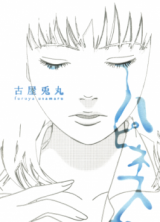Well, not sadness. Perhaps... melancholy?
For those unfamiliar with Furuya-sensei's works, he's probably best known for his collection ko-gal themed one shots, "Short Cuts". He has shown a capacity for humor and the ability to show the frivolousness of society for what it is. For those who have read Short Cuts, and are looking at Happiness, forget everything you knew about Furuya-sensei's work before.
Perhaps Short Cuts gave you the impression that his work was meant to be light-hearted, perhaps even that he was a comedy manga-ka. Reading Happiness, however, may help you realize the truth- his talents do not lie in comedy, but rather in portraying things as what they are. To start, here is my impressions of the stories contained in this excellent volume...
The first story, "Teased and Stepped on, What Blooms is a Passionate Flower" seems a simple story of a girl who has a relationship with her teacher. But reading it, you get the emotions and reasons behind the situation from the girl's perspective, and the feelings of love are conveyed simply and powerfully through her actions as much as her words. Her methods of conveying her feelings may strike some as self-depreciating, but those able to look past the surface may see what lies beneath.
"Lolita #7" is a bit stranger, perhaps merely because of the 'love interest' that the heroine expresses feelings for. I wasn't able to connect with this story quite as much, perhaps because of the slight manipulative feel of it, but that is not to say that it wasn't satisfying in its' own right.
"Song of the Devil" is a look into the life of a troubled girl from the point of view of her best friend. A girl obsessed with Satan is seemingly just maladjusted and, admittedly, somewhat annoying. Her friend begins to find out exactly what was going on behind the scenes, and, later, exactly what the idea of being a bride of Satan might mean to her. Not a particularly happy ending, but an ending nonetheless, and one that fits the story well.
"What if?" is a cute short story involving two bored friends on the train. The ending is a bit saddening, though, which isn't something you would likely expect out of the story going into it.
The titular "Happiness" involves a boy being bullied by a former best friend, who meets a girl mourning the death of a visual kei star in her own quiet way. The two become pact partners, though the bad luck of the protagonist catches up with him in a way. The ending of this particular story is a bit bittersweet, and something the reader probably won't see coming by the time it happens.
"A Room of Clouds" is the sad story of a girl who literally fails at life. Her lack of talent in any capacity and general passivity causes her to merely suffer the abuse and ridicule of those around her. The story is a bit longer than the others, or perhaps it merely feels that way as so much happens. It doesn't seem too crowded, and the pacing is good. The ending made me shed a tear, and makes me long to go over to my own sweetheart's house, if only to make sure he's still there...
"Indigo Elegy" Is a story about two boys and their symbiotic relationship regarding art. It continues a bit predictably, but ends on a strong note, making the reader feel somewhat uplifted.
"Underground Doll" is the last in the volume, a story about a girl much like the girl from "A Room of Clouds" in that she seems to be devoid of any actual talent or drive. These types of stories seem to be reflective of the kind of people typical manga leave behind- they are not the middle student, getting decent grades but slacking until they get swept up in some kind of big plot. Nor are they the aces, the ones who make the best grades, who are the stars of the athletic teams, who are beautiful and popular. Furuya-sensei has captured the essence of the background character, the ones who have no personality and no purpose, who are never fleshed out as people or even thought about. In this particular story, the feeling of genuine humanity comes through clearly, and the entire thing ends with a moment of true connection between two individuals society has no place for.
In the end, I would highly recommend this to anyone who is looking for a good one-volume read and prefers a bit of substance to their plot. It won't be enjoyed by those who rabidly consume the latest shounen craze or shoujo romance, but it stands out as an excellent read for those who can settle for quieter and simpler stories with true human feeling behind them.





